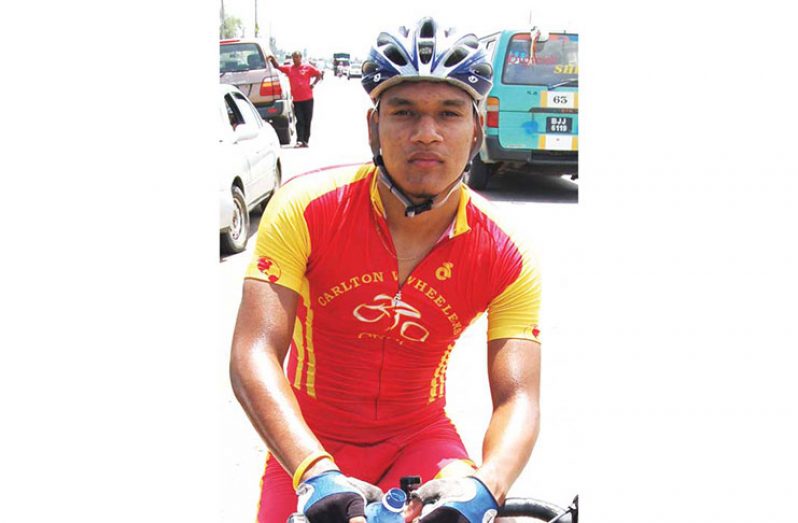–former National rider says athletes should be tested in the future to ensure safety
By Clifton Ross
ALONZO Greaves, one of Guyana’s most experienced cyclists believes that about 85 percent of his teammates will fall back on their form due to lack of real-time training, adding that he hopes measures are in place to properly provide COVID-19 testing for athletes in the future.
In an exclusive interview with Chronicle Sport on Monday, Greaves, a decorated local and international cyclist for a number of years, said he was worried about his fraternity. He said that as a professional rider, your main source of practice comes from road-racing, something he said is the closest thing to actually being involved in a competitive race.
Greaves pointed out that real-time training is a key part of a cyclists training regime, as it helps to buff the conditioning of a rider while helping to increase stamina.
“I think some guys are going to lose fitness because you prepare to train for upcoming year and the guys were training before the New Year started. They will fall back a lot; I think about 85 per cent of them. Some of the guys will be at home, while others will be with home trainers and they will get fed up eventually because most guys will want to do road racing to better their performances”, Greaves explained.
While actual training is key, Greaves said that cyclists in Guyana are at a disadvantage compared to riders internationally who have been staying fit by virtue of virtual training and, as such, that too adds to the shortcomings which will hamper local cyclists.
“Since COVID-19, not just in Guyana but worldwide, professional cyclists have been doing online training in order to stay fit during lockdown. We don’t have that technology here in Guyana to help keep us fit down here, so I think that too will throw the rider back a bit,” said Greaves.
The veteran cyclist, who is currently recovering from a leg injury, added that one way around the limited training schedule is for riders to have their own home-trainer. Greaves said the piece of equipment is all a cyclist needs to keep his or herself in peak condition while experiencing the same results as real-time racing.
“If I were racing right now, I would have been training at home on my trainer. Not everyone has a home-trainer so as a cyclist you have to invest in one, so when COVID-19 is finished you will have the fitness to compete and you will also have the advantage over the other guys who were probably not working,” said the veteran biker.
Wearing his businessman’s cap, Greaves said he thinks it will be difficult for the newer generation of cyclists to attract major sponsorship, something he said is very crucial when in the early stages of building one’s career.
“I think now business is really slow and the private sector will feel it because they are the ones that usually invest in our sport. When I riding, I used to approach sponsors with my letters, but now it’s harder for the youngsters to get sponsorship because you have to start spacing and doing well to get your name out. When your name isn’t out there, you can’t just go to businesses for sponsorship; you will need to win races because businesses will be expecting returns; so it will be tough for the youths coming up”.
Concluding his interview, the 2014 Commonwealth and world participant said he was looking ahead to what will happen post covid-19 with regards to how things will flow. He was also advocating for those in authority to put measures in place to help provide testing for local athletes, given the possibility of a potential second wave of the virus.
“I think after all of this, when people start moving around freely again, people will come out and support sports, entertainment or other activities. I also think that they will continue to practice the same safety guidelines now but I don’t believe gathering can happen right away.
He continued, “To protect our athletes, I think the persons involved in the COVID-19 committee should set up something to test athletes. They should visit the respective sports committees and associations in order to plan a way forward when it comes to testing and monitoring local athletes in the future”. Greaves ended.



.jpg)








